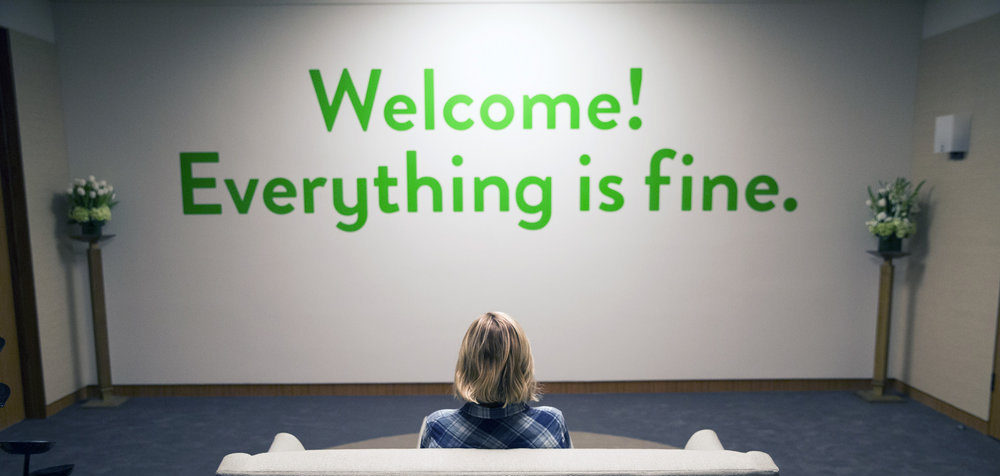FTT30111/PHIL33101: THE GOOD CLASS
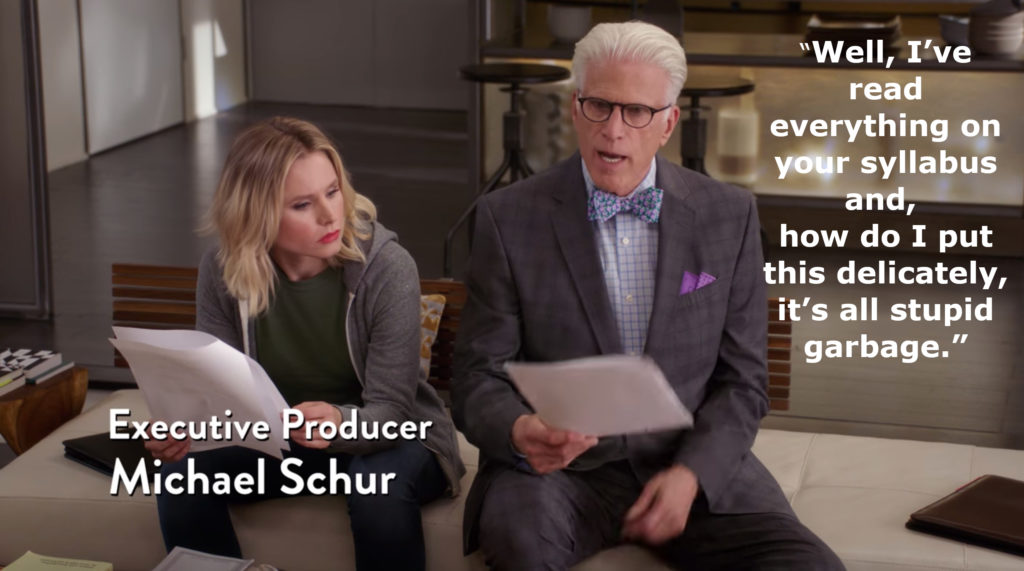
Click through to see the stupid garbage syllabus for The Good Class.
See below for the forking amazing final projects from students
and other fun stuff.
Course Description
This one-credit course offers an interdisciplinary deep dive into the ground-breaking NBC sitcom The Good Place for students in the Department of Film, Television, Theatre and the Department of Philosophy at the University of Notre Dame. We’ll look at the philosophical theories of goodness and human flourishing embedded in the episode’s stories. We’ll consider how moral change figures in comedy and how television helps shape the conversation between popular art and morality. We’ll analyze the economic and aesthetic forces that guide work like this and dig into the details of how the show was developed, produced, and received. And finally, we’ll do the most human thing of all: attempt something futile with a ton of unearned confidence and fail spectacularly!

Course Policies
Attendance: You are required to attend all sessions, with exceptions allowed only for documented illness and university-excused obligations. Pobody’s nerfect, but more than one unexcused absence will result in an Unsatisfactory grade and a devastating declaration that Ya basic.
Readings and screenings: You are expected to complete assigned readings and screenings for the day they are listed on the syllabus. All readings are available via Sakai, and screenings are available either on Sakai or Netflix. If you do not do the readings and watch the screenings, your brains will be removed, studied, and batted about Notre Dame Stadium like beach balls.
Honor Code: The scripts we read this semester are proprietary information and must not be distributed or shared in any way with anyone outside of this course; any violation of this rule will constitute an Honor Code violation. The Strong Questions and Final Reflection assignments submitted for this class must be completed on your own by virtue of your own ideas and efforts, while the Blogging Assignment must be undertaken only by the students in their assigned group with all outside sources duly credited. See http://honorcode.nd.edu/ for more information about Honor Code guidelines and procedures. Bottom line: Do not cheat off of Chidi, and if you do cheat on the BuzzFeed quiz “Do you know all the slang words the Kardashians invented?” at least be honest enough to admit you did. Also, no killing. Killing is one of the most famous moral no-nos.
Grading: The course will be graded on a Satisfactory/Unsatisfactory basis. We will rate you in five categories: dancing ability, coolness, dopeness, freshness, and smart-brained. Beyond that, if you attend all sessions, complete the required assignments according to the listed guidelines, and regularly participate in class discussions, you will receive a Satisfactory. If you are deficient in at least one of these areas, you will receive an Unsatisfactory. We promise the grading will be fair, even though fair is the stupidest word humans ever invented, except for staycation.
Assignments
1) Strong Questions for Guest Speakers: A strong question is one which you genuinely want to discover the answer to, is likely to be enlightening for the group, and helps us engage in a funny or serious way with a big idea behind the show. Students will be asked to prepare and submit two strong questions for each of our three guest speakers:
- In advance of the Michael Schur session, each student will compose and submit two strong questions to ask about The Good Place. One question should be related to production and/or media analysis. One question should be related to a philosophical theme underlying one or more of the episodes.
- In advance of the Pamela Hieronomyi session, each student will compose two strong questions about the philosophy behind the episodes.
- In advance of the Michael Swanson session, each student will compose two strong questions about the development and studio oversight aspects of the show.
- Sample questions: “You haven’t seen Hamilton?” “Hey, did you hear about Stephanie?” “Apples you eat their clothes, but oranges you don’t?”
2) Blogging Assignment: For each class session following the first meeting, a group of 2-3 students will craft a media-rich summary of the day’s key takeaways for public distribution on the course website, which must be posted by the next class session. Do this good thing because you’re good, not because you’re seeking moral dessert.
3) Final Reflection: Each student must submit by November 1 an individual final assignment that reflects upon their overall class experience. This assignment can be in any format of the student’s choosing: a personal essay, an episode review, a video essay, a spec script scene, a poem, fan art, etc. That’s right, you don’t have a final exam. It’s something way worse: A choice! That you have to make! With the student’s permission, this assignment will be shared on the course website.
Course Schedule and Weekly Learning Goals
Friday, September 6: What Is So Special About The Good Place?
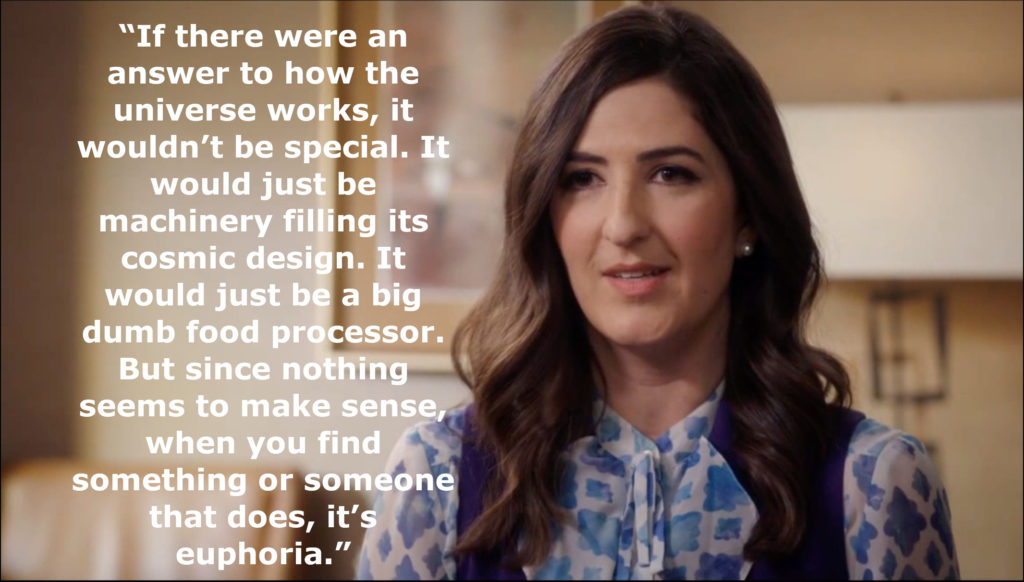
Episodes to watch: Ep101 “Everything is Fine” and Ep112 “Mindy St. Clair”
Reading: Ep101 writer’s draft and shooting script and “Moral Saints” by Susan Wolf
- Introductions: What Do You Make of the Show?
- Overview of network TV’s formal rules and exceptions in the GP pilot.
- Overview of network TV practices via the pilot development of GP.
- Understand the central question of virtue ethics that structures the GP pilot.
- Raise questions we hope to answer across the semester.
Friday, September 13: The Good Place & Typical Sitcom Episodic Structure/Seasonal Structure/Aesthetics
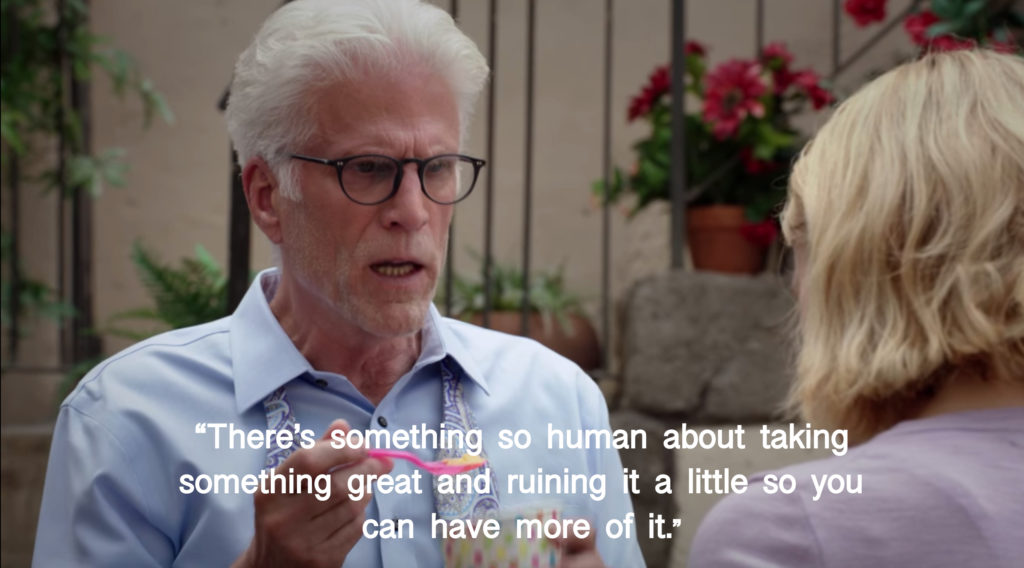
Episodes to watch: Ep113 “Michael’s Gambit” and Ep203 “Dance Dance Resolution”
Reading: Morreall, “Philosophy of Humor,” Epstein, “Writing the Script,” and Ep113 & Ep203 Shooting Scripts
- Analyze how the GP S1 finale changes the series premise, propels next seasons
- Identify conventional and unconventional plot elements in Ep 203 and pinpoint differences between script and final production.
- Introduce broad concepts in humor theory and aesthetics.
- Discuss the use of cliffhangers as plot devices.
- Prepare as a group for Michael Schur’s visit.
Monday, September 16: SCHUR DAY 12-2pm
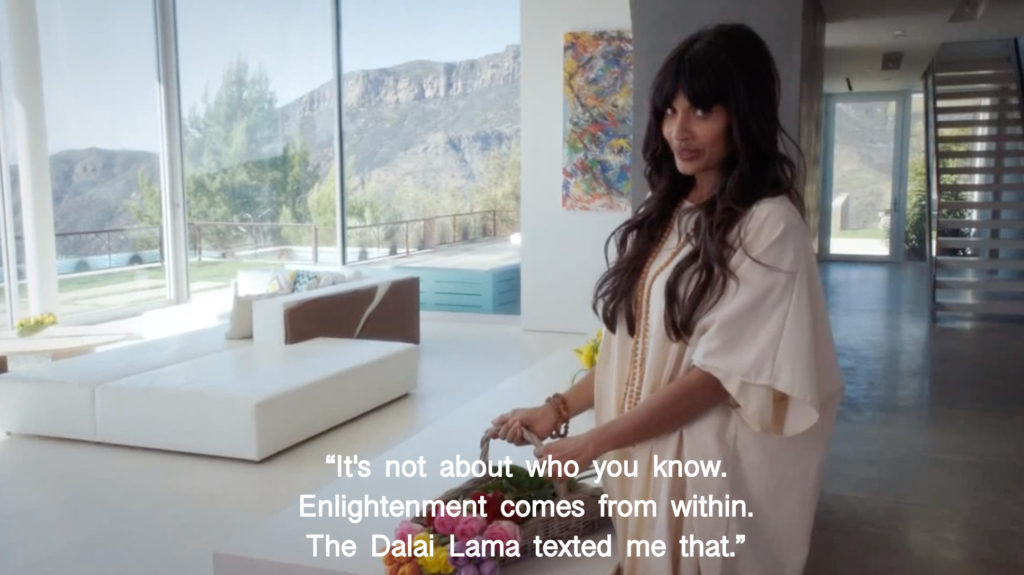
Note: Class meets with Mike Schur in 2nd Floor Founder’s Room at DPAC. Lunch (room temperature clam chowder, basically a savory latte with bugs in it) will be served.
Episodes to watch: Ep 309 “Don’t Let the Good Life Pass You By” and Ep 311 “The Book of Dougs”
Reading: Anderson, “The Ultimate Sitcom” and Sider, “Hell and Vagueness”
- Understand differences and similarities between the initial pitch for GP and the final product. What was the process of developing the idea?
- Discuss the philosophical benefits and paradoxes of The Point System.
- Formulate two strong questions to discuss with Schur about philosophy and/or production.
Monday, September 16: SCHUR DAY CONTINUED 6-7:30pm
“Can TV Make us Better People? A Conversation with Michael Schur.” Washington Hall. This is a ticketed event. We will distribute tickets for you in class. Doors open at 5:30pm.
Friday, September 20: Fan and Critical Reception & Marketing
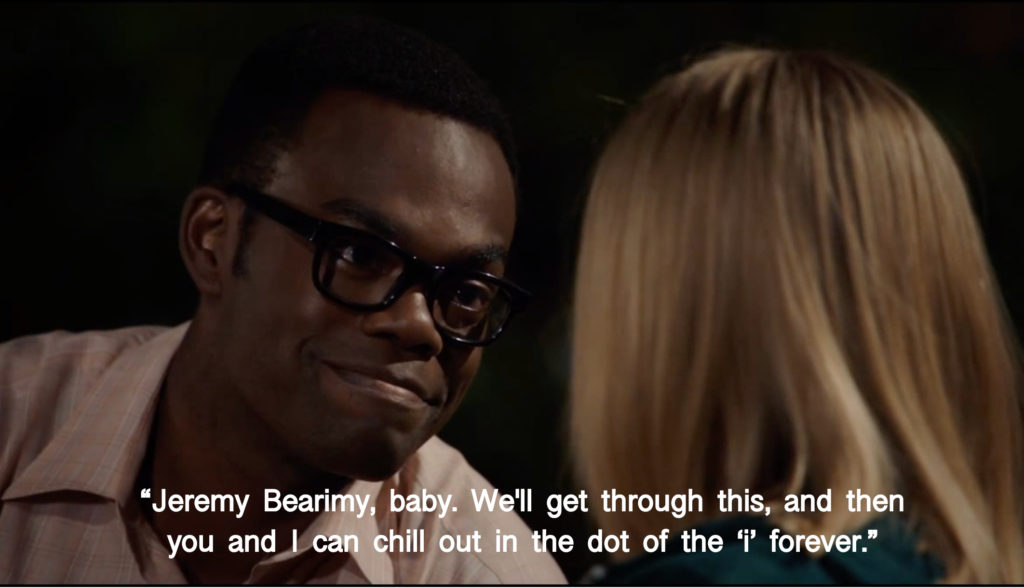
Episodes to watch: Ep 305 “Jeremy Bearimy” and Ep 313 “Pandamonium”
Reading: Gilbert, “Conspicuous Consumption: Industry Interpellation and Fan Consumption at San Diego Comic-Con”
- Debrief the Schur visit and discuss insights that came up.
- Discuss fan and critical discourse surrounding the series
- Analyze and debate critical reaction about whether Chidi and Eleanor earn soulmate status by Ep 313.
- Learn about the show’s promotion at Comic-Con from guest Melanie Kohnen, Assistant Professor of Rhetoric & Media Studies at Lewis & Clark College
Friday, September 27: No Class. Do something good!
Friday, October 4: Virtue Ethics for Script Writing with Guest Pamela Hieronymi
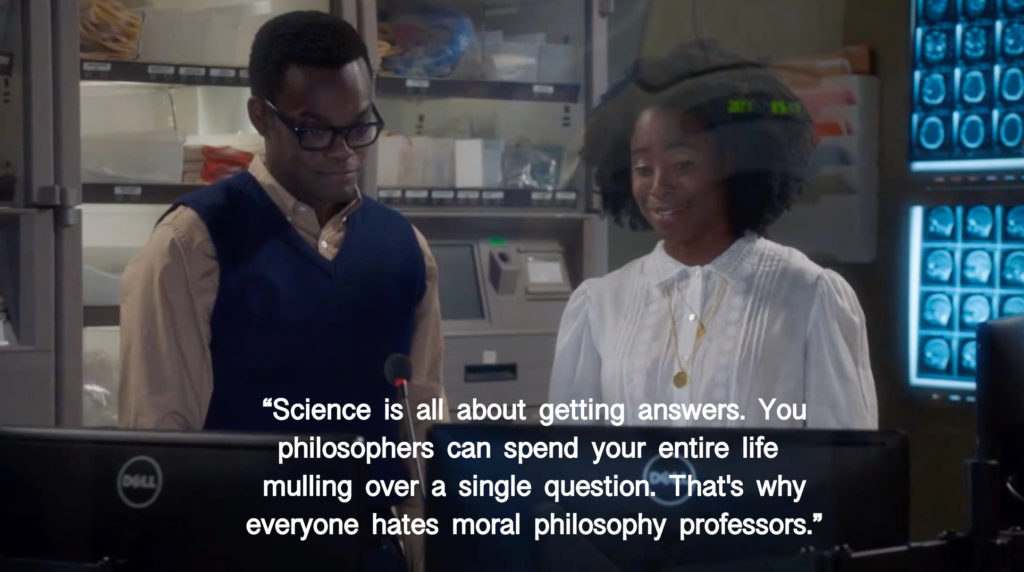
Episodes to watch: Ep 111 “What’s My Motivation?” and Ep 205 “Existential Crisis”
Reading: Donahue, “How Accurate is the Good Place’s Philosophy?” and Hieronymi, “The Reasons of Trust” AJP
- Discuss themes in contemporary virtue ethics and how well the show captures current ethical theory.
- Formulate two strong questions for Prof. Hieronomyi about the connection between virtue and humor.
OPTIONAL: Prof. Hieronymi will give a public lecture for the Notre Dame Institute of Advanced Study at 3pm. “Fairness, Sanction, and Condemnation.” You are welcome to attend. Reception afterward from 5-6pm.
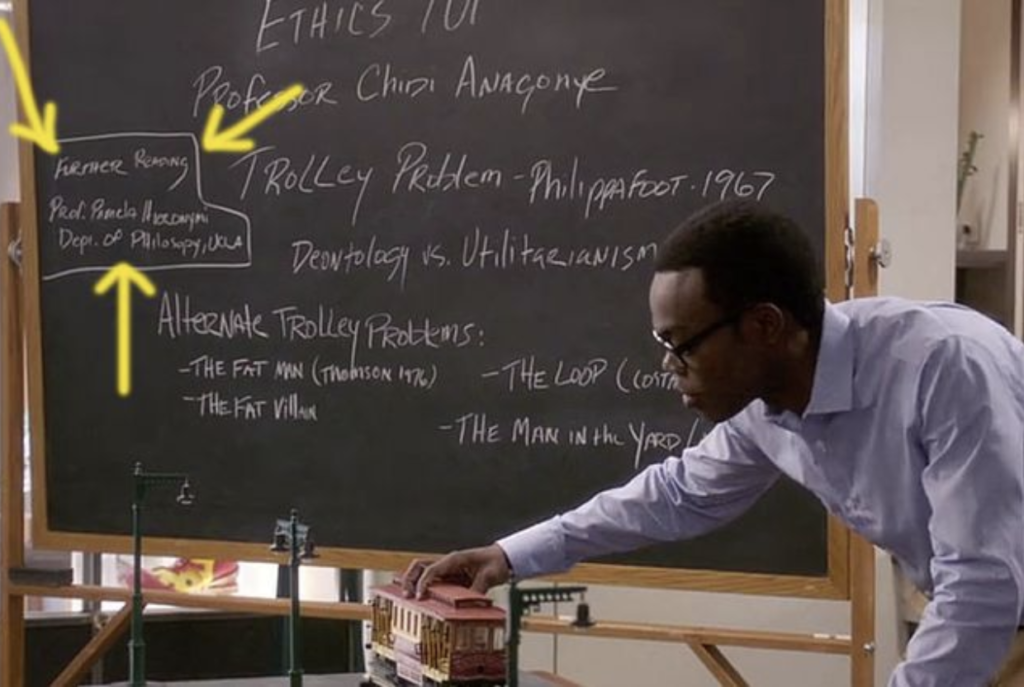
Friday, October 11: The Place of The Good Place in the TV Industry with Skype Guest Michael Swanson, VP of Production at NBC Universal
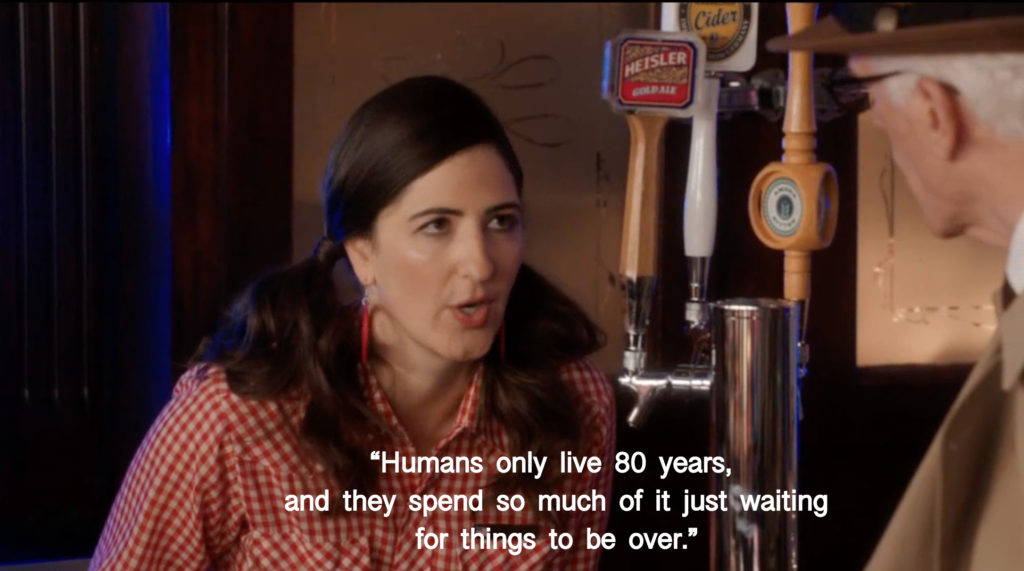
Episodes to watch: Ep 107, “The Eternal Shriek” and Ep 310, “Janet(s)”
Reading: Harrington, “The ars moriendi of US serial television: Towards a good textual death”
- Formulate two strong questions about the studio perspective on The Good Place
- Consider what aspects of The Good Place across each of its seasons would either concern or thrill a studio executive
- Debate the decision to end the series at Season 4
- What do you think would constitute a “good death” for The Good Place? How would you end the series?
